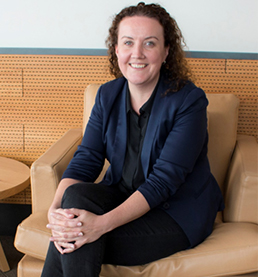Senior Research Officer, QIMR Berghofer Medical Research Institute
We sat down with Dr Kate Gartlan, to find out more about her Cancer Council Queensland funded research.

What is your area of research?
I am very interested in the pathways and mechanisms that drive inflammation, which are important in a broad range of diseases including cancer, autoimmunity and infection. Over the last 5 years I have been researching inflammatory responses following bone marrow transplantation with the aim to improve this treatment for blood cancer patients.
Why were you attracted to this area of research?
For many leukemia patients a donor bone marrow transplant is the only curative treatment, however the inflammatory complications can be very severe for some people. It is a very interesting and important problem that needs more study.
Can you tell me about the Cancer Council Queensland funded project you’re working on at the moment?
Complications arise in most recipients of a bone marrow transplant due to graft-versus-host-disease (GVHD). We have identified a protein that appears to play an important protective role early after transplant that limits inflammation and tissue damage. This study aims to understand how this pathway can prevent damaging immune responses and potentially harness this knowledge to develop new therapeutic approaches.
What do you hope the outcome of this project will be?
Once we understand how this protective pathway works, I hope to use this knowledge to develop new treatment approaches to help improve outcomes for these patients.
How will this have an impact on cancer patients?
By improving bone marrow transplantation and reducing the complications associated with this important cancer therapy, this will improve quality-of-life for cancer survivors and enable the application of this treatment to be broadened to a larger patient population.
Why is research so important?
Medical research is very important to not only help identify new treatments for cancer patients, but also to improve existing therapies. It is through many incremental and sometimes major, advances in our understanding of how our bodies work we can come up with new strategies to help when things don’t quite function as they should.
What drew you to a career in science?
I have always been a keen scientist since my early teens, this was probably inspired by some terrific teachers and a strong attraction to problem solving and technical detail.
What do you like about being a researcher?
I really enjoy the problem-solving elements to medical research. We study systems that thousands of people around the world study in parallel and we are still only part way there to nutting out how it all works. Contributing to this and making advances that could improve outcomes for patients is very rewarding work.
What are you most proud of in your research career?
I am proud of my work and contributions to studies ranging from basic biology, drug development all the way to clinical trials for new therapies. I am also proud of all the students and junior staff I have worked with and trained, I love watching them develop their skills and understanding.
What is your hope for the future?
I hope that my research can have a direct effect on improving people’s lives.
What’s your message to CCQ donors and supporters?
Whatever your motivation is for donating or spending your time fundraising and raising awareness for cancer research, it is very much appreciated. The research community really can’t do this without you!
Why is the funding that CCQ provides so important?
CCQ project grant funding is awarded to a broad range of research ideas and studies that would likely not be investigated without it. It can provide early proof of concept data for larger future studies or even help gather the very last important pieces to complete a study.
What does it mean to you that people donate or volunteer towards cancer research?
It always impresses me that people find the time/space in their lives to get out there and support cancer research. It means an enormous amount to the researchers who rely on this type of funding to continue their work.
Did you know?
In 2017, CCQ invested $10.9 million into lifesaving research.
We fund more cancer research than any other independent community-based charity in Queensland.
Thanks to research into cancer prevention, treatment and management, more than 19,500 cancer deaths were avoided between 1995 and 2014.
For the first time, the five-year relative survival rate from cancer in Queensland is more than 70 per cent.
